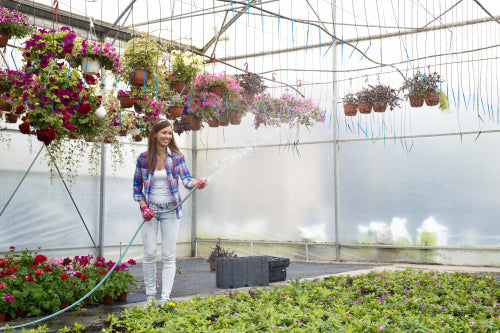When we think of a healthy garden, we often picture vibrant flowers, flourishing fruits, and abundant vegetables. However, behind the scenes, there are often tiny, industrious creatures working tirelessly to make all of this possible. Among the most crucial of these are bees and butterflies. These pollinators, though small in size, have a monumental impact on the health and productivity of your garden ecosystem.
In this article, we will explore the vital roles that bees and butterflies play in garden ecosystems, the benefits of their presence, and how you can support and protect these fascinating insects to create a thriving and sustainable garden.
Why Bees and Butterflies Are Essential for Your Garden
At the core of the relationship between bees, butterflies, and your garden is pollination. Pollinators, which include bees, butterflies, and other insects, are responsible for transferring pollen from the male part of a flower (the anther) to the female part (the stigma). This process enables fertilization, which is necessary for plants to produce fruits, seeds, and new growth. Without pollinators, many of the plants in your garden simply wouldn't be able to reproduce.
Bees and butterflies are particularly effective pollinators. While many insects contribute to pollination, bees are widely considered the most efficient. Butterflies, though less efficient than bees, still play an essential role, especially in attracting more diverse plant species to your garden. Together, these insects ensure that your garden remains a vibrant and productive ecosystem.
The Importance of Bees in Your Garden Ecosystem
Bees, especially honeybees and solitary bees, are the undisputed champions of pollination. These tiny creatures are responsible for pollinating a vast majority of the world's flowering plants. According to studies, bees are responsible for pollinating about 70% of flowering plants, including approximately 30% of crops grown for human consumption.
1. Pollination of Fruits and Vegetables
Bees are essential for the pollination of many fruits and vegetables found in our gardens. Without bees, plants like tomatoes, cucumbers, peppers, strawberries, apples, and many more wouldn't be able to reproduce. These crops, which are a staple in many home gardens, depend on bees to transfer pollen between flowers, ensuring the development of fruit.
2. Enhancing Biodiversity
Bees don't just pollinate food crops; they are also crucial for the pollination of ornamental plants and wildflowers. By helping these plants reproduce, bees contribute to the diversity of plant species in your garden. This biodiversity, in turn, creates a healthier and more resilient garden ecosystem.
3. Increased Crop Yields
Having a healthy population of bees in your garden can directly impact crop yield Research has shown that gardens with abundant pollinators tend to produce higher-quality fruits and vegetables. Pollination leads to better seed set, larger fruits, and increased overall harvests.
4. Honey Production
In addition to their vital role in the garden, bees also provide us with honey, a sweet byproduct of their labor. Gardeners who maintain beehives can harvest honey, creating a sustainable cycle that benefits both the garden and the beekeeper.
The Vital Role of Butterflies in Your Garden
While bees are the primary pollinators, butterflies are not far behind in their contribution to garden ecosystems. Although butterflies are less efficient than bees at transferring pollen, they still play a significant role in ensuring plant reproduction.
1. Pollination of Ornamental Plants
Butterflies are particularly effective at pollinating flowers with larger, flatter petals, like daisies, lavender, and other colorful, fragrant blooms. These flowers often rely on butterflies as their primary pollinators. Without butterflies, many ornamental plants would struggle to reproduce.
2. Attracting Other Pollinators
Butterflies also help to attract other pollinators to your garden, such as bees and hummingbirds. The vibrant colors and sweet scents of butterfly-attracting plants act as beacons for these additional pollinators, resulting in more efficient overall pollination and a healthier garden.
3. Supporting Biodiversity
Like bees, butterflies also contribute to the overall biodiversity of your garden. Many species of butterflies depend on specific plants for food and habitat, so by planting a variety of flowering plants, gardeners can support both bee and butterfly populations. This helps maintain a dynamic, thriving garden ecosystem.
4. Creating a Balanced Ecosystem
Butterflies play a key role in promoting balance in the garden ecosystem. They help control plant growth by pollinating certain species while encouraging the growth of others. Additionally, as butterflies mature into larvae (caterpillars), they become a food source for birds and other predators, maintaining a natural food web within the garden.
Supporting Bees and Butterflies in Your Garden
Given the critical roles that bees and butterflies play in maintaining a healthy garden ecosystem, it's important to support and protect these insects. Fortunately, there are several ways that gardeners can make their gardens more welcoming to these vital pollinators.
1. Plant Pollinator-Friendly Flowers
The most effective way to attract bees and butterflies to your garden is to plant a variety of flowers that provide nectar and pollen. Both bees and butterflies are attracted to flowers that are rich in nectar. Some great options include lavender, sunflowers, coneflowers, daisies, and zinnias. Additionally, native plants are particularly attractive to local pollinators and often require less maintenance.
2. Provide a Water Source
Bees and butterflies, like all creatures, need water to survive. Including a small water feature in your garden, such as a birdbath or shallow dish with pebbles, can provide an essential resource for these insects. Be sure to keep the water clean and change it regularly to prevent the growth of algae or bacteria.
3. Create Nesting Habitats
While bees are busy collecting nectar, they also need a safe place to nest. Solitary bees, in particular, do not live in hives like honeybees but instead create nests in hollow stems, dead wood, or underground burrows. To support these bees, consider leaving some areas of your garden slightly untidy, with piles of leaves, dead wood, or brush where they can nest. For butterflies, planting specific host plants where they can lay their eggs can also help attract them to your garden.
4. Avoid Pesticides
Pesticides are harmful to pollinators, particularly bees and butterflies. If you must use pest control methods, opt for natural alternatives like neem oil or insecticidal soap. Alternatively, use targeted approaches that minimize the risk to pollinators, such as applying treatments early in the morning or late in the evening when bees and butterflies are less active.
5. Maintain a Diverse Garden
A garden that supports a variety of plants will provide food and shelter for a range of pollinators. The more diverse your garden, the more likely it is to attract a wide array of bees, butterflies, and other beneficial insects. This diversity helps maintain the balance of the garden ecosystem, making it more resilient to pests and diseases.
Healthy Garden Ecosystem
Bees and butterflies are not just charming garden visitors; they are essential players in the intricate web of life that sustains a healthy garden ecosystem. By supporting these pollinators, you not only boost the productivity of your garden but also contribute to preserving biodiversity, ensuring the health of the environment, and promoting a sustainable future.
By planting pollinator-friendly flowers, creating habitats, providing water, and avoiding harmful pesticides, you can make your garden a haven for these vital insects. In return, your garden will thrive, producing beautiful flowers, bountiful crops, and a rich tapestry of life that supports both human and wildlife populations.
So, the next time you spot a bee buzzing around or a butterfly fluttering through your garden, take a moment to appreciate the invaluable work they do. After all, the health of your garden is a reflection of the health of the natural world around you.
You may also be interested in: Orchideen zum Blhen bringen: So gelingt es einfach - Tipps vom ...
Discover your gardening joy with a top selection. Your joy and green happiness begin here. Shop Now
Powered by flareAI.

